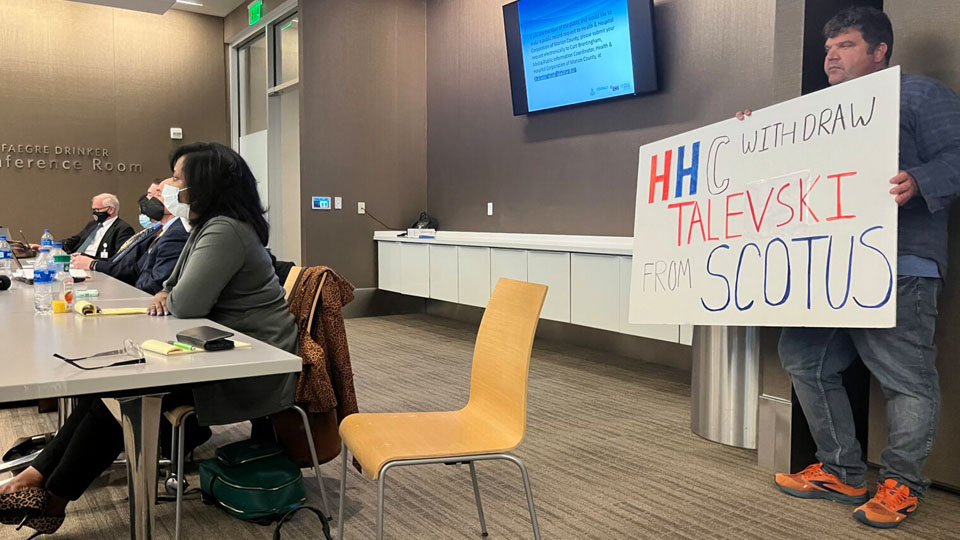HHC board ignores protesters, takes no action on Medicaid case
Subscriber Benefit
As a subscriber you can listen to articles at work, in the car, or while you work out. Subscribe Now
The board of trustees for the Health and Hospital Corp. of Marion County declined to halt a federal lawsuit Tuesday that many fear would diminish the civil rights of patients in public facilities, specifically for those using Medicaid in government-owned, long-term care facilities.
Over two dozen activists and lawmakers pushed the board to drop the suit, known as Talevski v. Health and Hospital Corporation of Marion County, which the U.S. Supreme Court is scheduled to hear Nov. 8. They say that if the Supreme Court rules in favor of HHC, beneficiaries of government support programs wouldn’t be able to sue for civil rights violations.
“I would hope that the one hospital that claims to take all of the state funds for those that are underserved wouldn’t be at the top of the ticket to destroy and hurt everyone that is underserved,” said Kim Saylor, a Medicaid recipient receiving treatment at Eskenazi Health.
The case stems from the treatment and death of Gorgi Talevski at a Valparaiso long-term care facility. The Health and Hospital Corporation of Marion County (HCC) owns that nursing home, along with 77 others across the state in addition to operating the Marion County Health Department and Sidney & Lois Eskenazi Hospital in Indianapolis.
Activists last week said they’d been pressuring the board since May with little success, even as Indianapolis Mayor Joe Hogsett and City Councilors signaled their disapproval.
Eskenazi Health, owned by HHC, is a publicly funded hospital system with a mandate to provide care for the poorest Hoosiers. The gathered activists from across the state criticized the corporation’s continued reliance on government funding for nursing homes, which the IndyStar has documented extensively, even as they push to curtail federally protected rights.
“You’re not even going to vote? You’re going to hide and pretend that nothing is wrong here?” said Mike Oles III, an activist with the leftwing organization Our Revolution. “You’re going to hold nursing home profits over the rights of poor people?”
Oles noted that even House Speaker Nancy Pelosi and President Joe Biden’s administration had weighed in on the case, urging it to be dismissed. After the board declined to take any action, he called for every member to be fired and replaced.
“They have no moral vision for the city and they’re using our health care system as a weapon against poor people,” Oles said. “They’re greedy contractors and benefactors themselves… It’s real sad; they should all be fired and replaced.”
No response from the board
Board members were stone-faced through the often emotional public testimony, ignoring pleas for public discussion and a vote. The suit was filed by President and CEO Paul Babcock and not the board of trustees, meaning the corporation has never publicly discussed its decision to appeal the case to the nation’s highest court.
Even a state’s Public Access Counselor’s opinion agreed that the corporation had violated the state’s open door laws by allowing the CEO, rather than the board, to pursue the lawsuit.
As Robert Lazard, who led the board meeting, left the room to chants of “shame” and “do something,” he declined to comment on the ongoing ligation and even whether the board had any power to retract the petition.
Though chosen by Marion County elected officials, not even city-county councillors had the answers they sought.
“There needs to be some clarity. If you’re not going to take a position or reverse course… why? I understand the legal basis and that folks say you can’t always comment on those things but there has to be a way to communicate to the public and to elected officials,” said Jared Evans. “There’s a rush of so many different emotions – both angry and both sad – but you can tell that the passion here, from these folks, is real.”
Evans, an Indianapolis City-County Councillor, read a letter signed by 15 of the city’s 25 councillors, urging the board to reverse course to protect beneficiaries of Medicaid and other government programs.
“Unfortunately, given the current makeup of the Supreme Court of the United States, the undersigned city-council councillors believe that HHC’s petition… has the potential for a sweeping opinion well beyond the specific facts of this case that would be a clear and dangerous threat to the civil rights protections of our nation’s most vulnerable citizens,” Evans read.
Even without the action from the board, two other parties could continue to pursue the case: American Senior Communities, the operator of the nursing home, and the Valparaiso nursing home itself.
Indiana Attorney General Todd Rokita, and 21 other Attorneys General, have signified their support for nursing homes in a brief submitted to the court.
